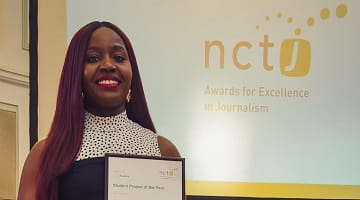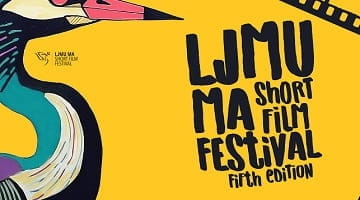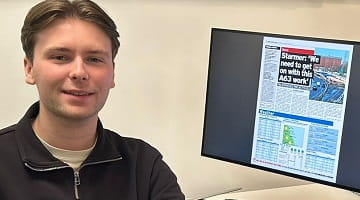Why study this course with LJMU?
- To turn your creativity and passions into a Content Creator career
- 95% of students surveyed said the teaching staff on our media courses were good at explaining things (National Student Survey 2024)
- Designed with students in collaboration with practitioners and industry
- As well as the traditional media formats, explore the foundations and boundaries of Mixed Realities Production enabling you to innovate and inspire using hands-on, active learning
- Build the toolkit and adaptable attitude to gain employment in the highly competitive and rewarding creative industries
- WATCH: The 2023 student showreel
About your course
This BA (Hons) Media Production degree at Liverpool John Moores University is next generation focused.
The course is a creative industries training ground with an emphasis on both the traditional craft skills and studio models as well as the emerging crafts of mixed realities.
We are a hands-on, active learning programme. We show, then you do.
You will use various hardware and software solutions in response to the creative, theoretical, and critical challenges set. You will learn the traditional preproduction, production and postproduction skills of Moving Image and Audio Fiction and Non-fiction shorts. You will also explore Audio podcasting and live environments. You have the option of a TV Studio project in your second year, culminating in a live broadcast of a show you develop from scratch with your team. The newest strand of the design champions Digital Workflows and explores areas such as Immersive/Interactive storytelling, 360, VR and AR.
Virtual Production is moving fast, and we invite you to join us in exploring the foundations and new craft skills required to be successful in this field. In your final year, the Digital Disruption module invites you to take all the hardware and software craft skills you have developed and to break the rules - a digital sandbox to innovate and inspire.
This is a programme carefully designed by our students in collaboration with the delivery team and industry professionals. There is a new storytelling, marketing, development, and distribution strand that will help you understand how to capitalise on your creativity and turn passions in to a living.
Students were quite passionate in the redesign asking, How do we sell ourselves?. This lead to the inclusion of the Digital Marketing, development and Distribution modules on the programme to strengthen the graduate toolkit.
Our industry strand ensures you graduate with the key tools to gain employment along with your degree. That being a CV, showreel and online presence.
This is an exciting, rewarding industry but it is hard work and requires you to show up and put the energy in. If you do this, it will be a transformative experience culminating in your final major project. A calling card to industry that we can all to be proud of. We look forward to helping you set out on your lifelong journey in the Creative Industries.
Course modules
What you will study on this degree
Further guidance on modules
Modules are designated core or optional in accordance with professional body requirements, as applicable, and LJMU’s Academic Framework Regulations. Whilst you are required to study core modules, optional modules provide you with an element of choice. Their availability may vary and will be subject to meeting minimum student numbers.
Where changes to modules are necessary these will be communicated as appropriate.
Core modules
Core modules
Optional modules
Core modules
Professional accreditation
The Liverpool Screen School is a BAFTA albert Education Partner and proud to be working with albert to arm students with the sustainability knowledge they’ll need when joining the screen industries. BAFTA albert is the leading screen industry organisation for environmental sustainability.

Your Learning Experience
Excellent facilities and learning resources
We adopt an active blended learning approach, meaning you will experience a combination of face-to-face and online learning during your time at LJMU. This enables you to experience a rich and diverse learning experience and engage fully with your studies. Our approach ensures that you can easily access support from your personal tutor, either by meeting them on-campus or via a video call to suit your needs.
Teaching is delivered via a combination of practical and workshop classes, lectures, seminars, online activities and individual tutorials. Private study, individual and group production work as well as academic writing and research is an important aspect of degree-level study and so you will be expected to spend about 40% of your time working independently, when producing media, preparing essays, reports or presentations.
Plus you will be expected to complete independent study and group work and participate in online activities and discussions using our virtual learning environment, Canvas.
Work-related Learning
Work-based learning is a vital element of this degree programme and gives you a taste of what its really like to work in the media industry. You will not only get to practise skills you have learnt on the course, but you will also be able to add the experience to your CV, giving you a head start when it comes to finding your first job in this very competitive industry.
In fact many of our graduates have been offered a full-time position by their placement employer on the strength of successful work experience.
Dedicated personal tutor, plus study skills support
We believe that one-to-one support during your studies is vital, and for this reason you will be assigned a personal tutor from the minute you enrol at LJMU. He or she may teach some of your sessions, but you are also encouraged to arrange meetings with them to discuss course-related issues and ideas in a more informal setting. You will also receive support in finding and securing a work placement.
Assessment varies depending on the modules you choose, but will usually include a combination of exams and coursework.
We acknowledge that all students perform differently depending on how they are assessed, which is why we use a combination of assessment methods. These include: written work (essays, etc), presentations (group/individual), practical assessments (individual and team projects), producing web content, video productions both factual and fiction, studio and location, interactive products and portfolios (including e-portfolios).
Where you will study
The School is based in the Redmonds Building, in the heart of the bustling Mount Pleasant Campus and Liverpool's growing Knowledge Quarter. The building is home to high quality lecture theatres and seminar rooms, TV studios, radio suites, green screen, editing rooms and news rooms, social spaces, and a café. It is only a short walk from LJMUs Aldham Robarts Library, which contains all the resources you will require for your studies, and is open seven days a week.


LJMU Media Production students proved invaluable to us. Our oral storytelling website Peoples-Stories.com was in need of streamlining and as a small indie we didn't have time to analyse what the next stage in its evolution should be. Thanks to the LJMU team we got a clear and well thought through appraisal.
Career paths
You will be encouraged to take advantage of the wealth of work experience available via the School’s Production Unit. This unique aspect of the course offers you the opportunity to undertake paid and unpaid work for professional clients, helping you build up a genuine CV of media work experience to present to potential employers.
Graduates from Media Production have an excellent employment record, particularly in professional broadcast media, ranging from television researchers and assistant producers, camera assistants, designers, press officers, technical directors, producers of new media and online content.
The course has a history of success in film and media competitions with graduates winning coveted Royal Television Society Student Awards in Documentary (2013 and 2015), Drama (2016), and in the Comedy and entertainment category for The Trick in Trick or Treat, a comedy drama which three students produced for their final production project.
Some students also go on to set up their own production companies making music videos, corporate and short films as well as web design and new media production. Progression onto postgraduate study is also a route for Media Production graduates.
Student Futures - Careers, Employability and Enterprise Service
A wide range of opportunities and support is available to you, within and beyond your course, to ensure our students experience a transformation in their career trajectory. Every undergraduate curriculum includes Future Focus during Level 4, an e-learning resource and workshop designed to help you to develop your talents, passion and purpose.
Every student has access to Careers Zone 24/7, LJMU's suite of online Apps, resources and jobs board via the LJMU Student Futures website.
Tuition fees and funding
- Full-time per year:
- £9,535
Fees
The fees quoted above cover registration, tuition, supervision, assessment and examinations as well as library membership and student IT support with access to printed, multimedia and digital resources including programme-appropriate software and on campus Wi-Fi.
Financial Support
The University offers a range of scholarships to support students through their studies. You'll find all the information you need on our specialist funding pages, including details of the Student Support Fund and other activities to support with the cost of living.
Additional Costs
In addition to fees, students should also keep in mind the cost of:
- Accommodation
- Travel costs including those for placements, visas and travel for studying abroad and field trips unless paid for by LJMU
- Stationery, IT equipment, professional body membership and graduation gown hire
The University reserves the right to increase tuition fees in accordance with any changes to the maximum allowable fees set by the UK Parliament. In the event of such a change, any fee increase will be subject to a maximum cap of 10% of the total course cost as originally stated at the time of your offer.
Entry requirements
Please choose your qualifications below to view requirements
Grades/points required from qualifications: BCC-BBB (104-120)
Work out how many UCAS points your qualifications are worth by visiting the UCAS Tariff Calculator.
Qualification requirements
How to apply
Securing your place at LJMU
UCAS is the official application route for our full-time undergraduate courses. Further information on the UCAS application process can be found here https://www.ljmu.ac.uk/study/undergraduate-students/how-to-apply.
The essential skills that should be included on your application form are:
- Applicants should display an enthusiasm and aptitude for studying this area
- Applicants should show evidence of extracurricular activities in this field of study
- Applicants must be team players and your application must reflect this
- Applicants should demonstrate their qualities as creative practitioners
Your university life
From accommodation and academic support to clubs and societies. Find out what LJMU has to offer.
Related Links
Talk to our students
Connect with a current LJMU student for advice and guidance on university life, courses and more.
See what our students are saying
At LJMU we want you to know you're making the right choice by studying with us. You can see what our students are saying about their experience with us through their reviews on the following websites:
Related Links
News and views
Browse through the latest news and stories from the university
The university reserves the right to withdraw or make alterations to a course and facilities if necessary; this may be because such changes are deemed to be beneficial to students, are minor in nature and unlikely to impact negatively upon students or become necessary due to circumstances beyond the control of the university. Where this does happen, the university operates a policy of consultation, advice and support to all enrolled students affected by the proposed change to their course or module.
Further information on the terms and conditions of any offer made, our admissions policy and the complaints and appeals process.































